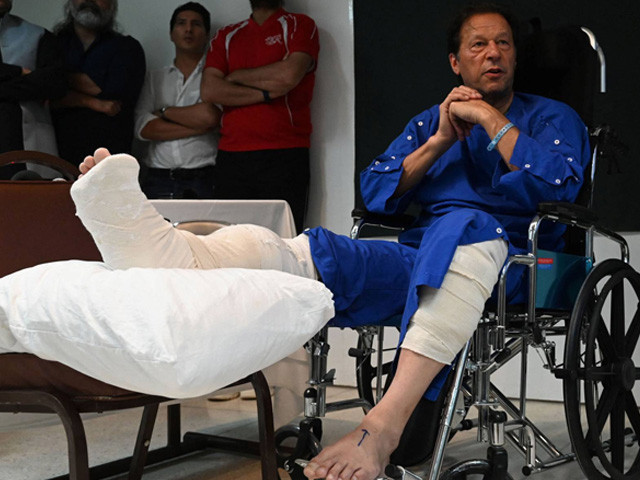"Imran Khan narrowly survives an assassination attempt", reads a headline. The masses were shocked and infuriated at such an unfortunate happening. The incident was soon followed by a wave of furious protests across the country, with the protesting masses giving vent to anti-military rage. This is how the masses react to an attempt on the life of a populist leader.
Political differences aside, assassinating a political figure just because he espouses a different political ideology is insane. Democracy doesn’t allow the use of such measures to gag an opposing political voice. In democracies, there is always recourse to peaceful political methods for winning over an opposition. Use of highhandedness for one’s inability to be politically prosperous is cowardly and non-democratic.
However, what disturbs the mind of every sane person is that why attempting on the life of a political leader who has following in millions. This could have a shattering impact on Pakistan as the man is a messiah for such a large following, but it doesn't look like anyone is the least concerned about Pakistan's integrity anymore.
This incident, moreover, could further escalate the tensions and polarise the Pakistani society.
One wonders why there is no tolerance for anything of a different shade and colour in Pakistan and why one always should be from the mainstream in order to be safe. This a characteristic of fascism: zero tolerance for an opposing viewpoint. If the Pakistani society is intolerant of a different viewpoint, the society at large is fascistic.
Sadly, Pakistan has historically been a place where assassination for political reason is a normal occurring. This tragic saga of assassinations started soon after Pakistan got independence in 1947. The first person who fell victim to political assassination was one of Pakistan’s founding fathers, Liaquat Ali Khan. Ironically, his assassin is yet to be discovered. Moreover, he is not the only one who has been assassinated for political reasons. A long list of political personalities have been assassinated to this day, which includes the famous Nawab Akbar Bugti, Benazir Bhutto and Khan Abdul Jabbar Khan. Moreover, the Bilour family of Peshawar should better be called a family of assassinated individuals, as many of the family members have been slain.
However, what is upsetting is that the assassin’s identity in most of the cases is never discovered. In some cases, even the assassins are not even pursued.
Pakistan, which brands itself as a democratic state, has all the aspects of a fascist state. Instead of having a culture of openness and tolerance, it has a culture of assassinations and repression. For democracy to flourish, a tolerant environment is required, which, however, is not the case in Pakistan.
Moreover, Pakistan’s 1973 Constitution has expressly defended a person’s right to live. It has further disallowed the violation of this right in strong words. In addition to this, the Constitution has defended political rights of every person as well. Therefore, assassinating someone for political reasons is unconstitutional and punishable.
The recent assassination attempt on such a popular political figure, while the country is reeling from an economic and political chaos, tantamount to an assault on the sovereignty of the nation. In an era of backbreaking inflation, soaring unemployment and terrorist resurgence, the introduction of such an incident is one step close to igniting a civil war.
When the late Benazir Bhutto was at the height of her political career, those who couldn’t digest her success, wiped her out. Her assassination was followed by frenzied destruction from her indignant party workers and deep mourning from the people of Pakistan. Sadly, incidences of assassinations for political purposes have now become a norm in Pakistan. Less influential people have also been gunned down, citing political reasons. The murder of Nazim Jhokio is one such case.
In such a toxic and dangerous political environment, the progress of society remains a pipe dream. As the Pakistani youth has already been disillusioned and disenchanted about the Pakistani society, maintaining such a dangerous political atmosphere for longer could lead to the dismemberment of Pakistan.
Conclusively, this culture of assassinations must change. While polities across the world are progressing rapidly, Pakistan remains medieval and its political system sits atop the culture of assassinations. However, Pakistan’s need of the hour is tackling the economic turmoil and ensuring political stability, rather than allowing political and non-political elements to drag one another down the road of death and destruction. The state’s business is ensuring people’s safety, economic and political stability which, sadly, Pakistan is not doing. Its attention seems to be directed elsewhere.



COMMENTS
Comments are moderated and generally will be posted if they are on-topic and not abusive.
For more information, please see our Comments FAQ